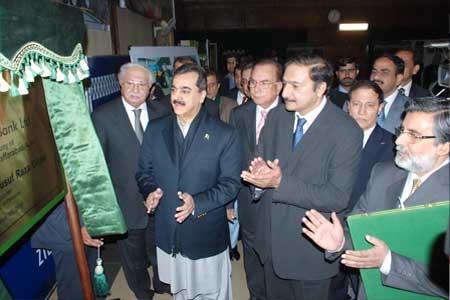|
Sharia Nizam-i-Adl Regulation 2009
The Nizam-e-Adl Regulation ( en, Order of Justice) was a controversial act, passed on April 13, 2009 by Government of Pakistan that formally established Sharia law in the Malakand division. PPP-led central government passed the bill after a coalition partner ANP government in Khyber Pakhtunkhwa negotiated the peace deal with outlawed Tehreek-e-Nafaz-e-Shariat-e-Mohammadi. Background In the wake of the U.S. invasion of neighboring Afghanistan and the resurgence of the Taliban, regions surrounding the Afghan-Pakistani border suffered great destabilization. After the siege of Lal Masjid in 2007, Pakistani troops and Islamic militants vied for control of the Swat Valley. Reports suggested that hard-line cleric Maulana Fazlullah and his Taliban-aligned Tehreek-e-Nafaz-e-Shariat-e-Mohammadi (TNSM) had established control of 59 villages in the region and as much as 70 percent of the Swat. In an effort to end the violence the Awami National Party-led provincial government of ... [...More Info...] [...Related Items...] OR: [Wikipedia] [Google] [Baidu] |
Government Of Pakistan
The Government of Pakistan ( ur, , translit=hakúmat-e pákistán) abbreviated as GoP, is a federal government established by the Constitution of Pakistan as a constituted governing authority of the Administrative units of Pakistan, four provinces, two autonomous territories, and one federal territory of a Parliamentary democracy, parliamentary democratic Parliamentary republic, republic, constitutionally called the Pakistan, Islamic Republic of Pakistan. Effecting the Westminster system for governing the state, the government is mainly composed of the Executive branch, executive, Legislative branch, legislative, and Judicial branch, judicial branches, in which all powers are vested by the Constitution of Pakistan, Constitution in the Parliament of Pakistan, Parliament, the Prime Minister of Pakistan, Prime Minister and the Supreme Court of Pakistan, Supreme Court. The powers and duties of these branches are further defined by acts and amendments of the Parliament, including the ... [...More Info...] [...Related Items...] OR: [Wikipedia] [Google] [Baidu] |
Asif Ali Zardari
Asif Ali Zardari ( ur, ; sd, ; born 26 July 1955) is a Pakistani politician who is the president of Pakistan Peoples Party Parliamentarians and was the co-chairperson of Pakistan People's Party. He served as the 11th president of Pakistan from 2008 to 2013, the first president born after Independence Day (Pakistan), Independence. He is the widower of twice-elected Benazir Bhutto, former Prime Minister of Pakistan Benazir Bhutto. He has been a member of the National Assembly of Pakistan since August 2018. The son of Hakim Ali Zardari, a landowner from Sindh, Zardari rose to prominence after his marriage to Benazir Bhutto in 1987, who became the Prime Minister of Pakistan after 1988 Pakistani general election, her election in 1988. When Bhutto's government was dismissed by President Ghulam Ishaq Khan in 1990, Zardari was widely criticized for Corruption charges against Benazir Bhutto and Asif Ali Zardari, involvement in corruption scandals that led to its collapse. When Bhut ... [...More Info...] [...Related Items...] OR: [Wikipedia] [Google] [Baidu] |
Muttahida Qaumi Movement – Pakistan
Muttahida Qaumi Movement (Pakistan) ( ur, MQM-P) is a Social liberal Muhajir nationalist Secular political party. The leader of the party is Khalid Maqbool Siddiqui. The party's symbol is the kite. It is mostly active in Karachi where up to majority of Muhajirs currently reside. The party aims to represent the Human rights of Muhajirs in Pakistan through peaceful and democratic struggle. The Party is the spliter faction of Muttahida Qaumi Movement – London. History The party came into existence due to a split within the Muttahida Qaumi Movement, and was founded as a separate party by Farooq Sattar, who split it from MQM founder and leader Altaf Hussain. The faction was announced after Sattar's release from custody by the Pakistan Rangers, a paramilitary organization. Election campaigns MQM-P participated in two major by-elections since its formation, but was defeated in both. Senate of Pakistan National Assembly Sindh Assembly Merger with PSP On 8 Novembe ... [...More Info...] [...Related Items...] OR: [Wikipedia] [Google] [Baidu] |
Federally Administered Tribal Areas
, conventional_long_name = Federally Administered Tribal Areas , nation = Pakistan , subdivision = Autonomous territory , image_flag = Flag of FATA.svg , image_coat = File:Coat of arms of FATA.svg , image_map = Federally Administered Tribal Areas in Pakistan (claims hatched).svg , image_map_caption = Former Location of the Federally Administered Tribal Areas , event_start = Established , year_start = 1947 , date_start = 14 August , year_end = 2018 , date_end = 31 May , event_end = Merged into Khyber Pakthunkhwa , s1 = Newly Merged Tribal Districts , stat_year1 = 2017 , stat_area1 = 27,220 , stat_pop1 = , today = Khyber Pakhtunkhwa, Pakistan , demonym = , area_km2 = , area_rank = , GDP_PPP ... [...More Info...] [...Related Items...] OR: [Wikipedia] [Google] [Baidu] |
Jamiat Ulema-i-Islam
Jamiat Ulema-e-Islam Pakistan (Fazl) also Jamiat Ulema-e-Islam (F) or simply as Jamiat Ulema-e-Islam (Urdu: ; ; JUI-F) is a Deobandi Sunni political party in Pakistan. Established as the ''Jamiat Ulema-e-Islam'' in 1945, it is the result of a factional split in 1988, ''F'' standing for the name of its leader, Fazal-ur-Rehman. It is almost entirely based in southern Khyber Pakhtunkhwa and northern Balochistan, which are mostly inhabited by Pashtuns. The JUI-S faction, led by Samiul Haq, is of regional significance in Khyber Pakhtunkhwa but has no representation on the national level. The split of JUI into two factions was due to dissent over the policy of Pakistani president Zia-ul-Haq of supporting Mujahideen outfits in the Afghanistan war during the 1980s. One of its faction, Jamiat Ulama-e-Islam Nazryati (JUI-N), split in 2007 and merged back into JUI-F in 2016. On 29 December 2020, Jamiat Ulema-e-Islam Pakistan (JUI-P) split as a separate political party under the leade ... [...More Info...] [...Related Items...] OR: [Wikipedia] [Google] [Baidu] |
Pakistan Muslim League-Q
The Pakistan Muslim League (Quaid e Azam Group) ur, ; ''Pākistān Muslim Līg (Qāf)'', Acronyms: PML(Q), PML-Q, PMLQ, "Q League") is a Conservative nationalist political party in Pakistan. As of the 2018 parliamentary election, it has a representation of 5 seats. It previously served as an ally of former Prime Minister Raja Pervez Ashraf's government, and led a joint election campaign in 2013 alongside Pakistan Peoples Party (PPP) in Punjab and Balochistan provinces against its rival Pakistan Muslim League (N), a fiscally conservative and centre-right force. Its leadership and members were once part of the Pakistan Muslim League (Nawaz) presided by former prime minister Nawaz Sharif. After the 1997 general elections, political differences arose that ultimately led to the creation of a faction inside the party. The dissidents, led by Shujaat Hussain, called for strong and vocal support for the 1999 military coup d'état staged and led by then- Chief of Army Staff and Chair ... [...More Info...] [...Related Items...] OR: [Wikipedia] [Google] [Baidu] |
Pakistan Muslim League-N
The Pakistan Muslim League (Nawaz) ( ur, , translit=Pākistān Muslim Līg (Nūn) PML(N) or PML-N) is a centre-right and liberal conservative political party in Pakistan. Alongside the Pakistan Tehreek-e-Insaf (PTI) and Pakistan Peoples Party (PPP), it is one of the three major political parties of the country. The party was founded by former Prime Minister Nawaz Sharif after the dissolution of Islamic Democratic Alliance in 1993. The party's platform is generally conservative, which involves supporting free markets, deregulation, lower taxes and private ownership. Although the party historically supported social conservatism, in recent years, the party’s political ideology and platform has become more liberal on social and cultural issues. One of several continuing factions of the original Muslim League, the seeds of the party were sown following the 1985 Elections when the Prime Minister of Pakistan Muhammad Khan Junejo organised the supporters of President Zia-ul-Ha ... [...More Info...] [...Related Items...] OR: [Wikipedia] [Google] [Baidu] |
Pakistan Peoples Party
The Pakistan People's Party ( ur, , ; PPP) is a centre-left, social-democratic political party in Pakistan. It is currently the third largest party in the National Assembly and second largest in the Senate of Pakistan. The party was founded in 1967 in Lahore, when a number of prominent left-wing politicians in the country joined hands against the military dictatorship of President Ayub Khan, under the leadership of Zulfikar Ali Bhutto. Affiliated with Socialist International, the PPP's platform has formerly been socialist, and its stated priorities continue to include transforming Pakistan into a social-democratic state, promoting secular and egalitarian values, establishing social justice, and maintaining a strong military. The party, alongside the Pakistan Muslim League-Nawaz and the Pakistan Tehreek-e-Insaf, is one of the 3 largest political parties of Pakistan. Since its foundation in 1967, it has been a major centre-left force in the country and the party's leadership ... [...More Info...] [...Related Items...] OR: [Wikipedia] [Google] [Baidu] |
Yousuf Raza Gilani
Yusuf Raza Gilani (Urdu: ; born 9 June 1952), is a Pakistani politician who served as 18th Prime Minister of Pakistan from 25 March 2008, until his retroactive #Disqualification and ouster, disqualification and ouster by the Supreme Court of Pakistan on 26 April 2012. He currently serves as the Vice Chairman, vice-chairman of the Central Executive Committee of the Pakistan Peoples Party, central executive committee of the Pakistan Peoples Party. and in 2021 was elected as a Senate of Pakistan, Senator. On 26 March 2021, he was appointed as Leader of Opposition in the Senate of Pakistan. Gillani is also a consultant to Cheshire East Council in England. After the 1988 Pakistani general election, 1988 general elections, he secured his ministerial appointment in the Ministry of Tourism (Pakistan), Ministry of Tourism in the Bainazir Bhuttoo Government, government of former prime minister Benazir Bhutto, and since then, he had been a senior member of Pakistan Parliament, parliament ... [...More Info...] [...Related Items...] OR: [Wikipedia] [Google] [Baidu] |
Moral Support
Moral support is a way of giving support to a person or cause, or to one side in a conflict, without making any contribution beyond the emotional or psychological value of the encouragement by supporting them. For example, in a war between two countries or alliances, a third nation may give moral support to one side, without actually participating in the conflict (for example, Paraguay in World War II). Another common example can be found in sports. By coming out to watch one's friend's team play a match, one is likely not directly supporting their team in any significant way, but one's friend may still feel encouraged by the moral support of one's presence. The line between moral support and other forms of help is often hard to draw. For example, some athletes report that they play better when the spectators encourage them—and in some cases referees' decisions may be influenced by a partisan crowd. There is also moral support that one can offer someone who is experiencing a ... [...More Info...] [...Related Items...] OR: [Wikipedia] [Google] [Baidu] |
Non-binding Resolution
A non-binding resolution is a written motion adopted by a deliberative body that can or cannot progress into a law. The substance of the resolution can be anything that can normally be proposed as a motion. This type of resolution is often used to express the body's approval or disapproval of something that they cannot otherwise vote on, due to the matter being handled by another jurisdiction, or being protected by a constitution. An example would be a resolution of support for a nation's troops in battle, which carries no legal weight, but is adopted for moral support. Use Non-binding resolutions are usually specific simple or concurrent resolutions that are not passed on to the executive branch to be signed into the law. These resolutions differ from pure concurrent resolutions (that are used for various procedural requests such as adjourning sessions) in that they are designed to express formally, document opinions and not initiate a process. These resolutions offer a means f ... [...More Info...] [...Related Items...] OR: [Wikipedia] [Google] [Baidu] |
Parliament Of Pakistan
The Parliament of Pakistan ( ur, , , "Pakistan Advisory Council" or "Pakistan Consultative Assembly") is the federal and supreme legislative body of Pakistan. It is a bicameralism, bicameral federation, federal legislature that consists of the Senate of Pakistan, Senate as the upper house and the National Assembly of Pakistan, National Assembly as the lower house. According to the Constitution of Pakistan, the President of Pakistan is also a component of the Parliament. The National Assembly is elected for a five-year term on the basis of adult franchise and one-man one-vote. The tenure of a Member of the National Assembly is for the duration of the house, or sooner, in case the Member dies or resigns. The tenure of the National Assembly also comes to an end if dissolved on the advice of the Prime Minister or by the president in his discretion under the Constitution. The Parliament meets at the Parliament House building in Islamabad, where debating chambers for both houses a ... [...More Info...] [...Related Items...] OR: [Wikipedia] [Google] [Baidu] |






